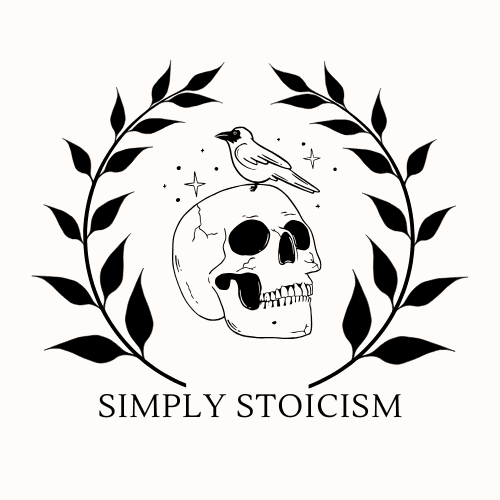12 Powerful Stoic Questions to Transform Your Life
Discover 12 life-changing Stoic questions used by top performers to overcome challenges and boost productivity. Ancient wisdom meets modern success - practical examples included.

Jon High
·
Jan 8, 2025
Ever notice how the most profound changes often start with a simple question?
Last week, stuck in gridlock traffic and already late for an important meeting, I felt my blood pressure rising. The familiar spiral of frustration was beginning - until I remembered to ask myself one of the questions we're about to explore. Within seconds, my perspective shifted completely.
That's the power of a well-crafted question. And nobody understood this better than the Stoics. These ancient philosophers weren't interested in theoretical debates or abstract concepts - they were focused on practical wisdom for daily life. Their philosophical tradition wasn't just about enduring hardship - it was about asking the right questions to cut through mental noise and see reality clearly.
Today, I'll share 12 questions derived from Stoic wisdom that have the power to transform how you approach challenges, make decisions, and navigate daily life. These aren't just theoretical exercises - they're practical tools that have helped everyone from Roman emperors to modern CEOs maintain clarity under pressure.
1. "Is this within my control?"
This question, inspired by Epictetus's dichotomy of control, is the foundation of Stoic thinking. When facing any situation, start here.
Let me share a recent example. A client project was delayed because a key stakeholder went on unexpected medical leave. Initially, my mind raced with frustration and anxiety. But when I asked myself this question, I realized:
Within my control:
How I communicate with the remaining team members
The quality of work I continue to deliver
Developing contingency plans
My attitude toward the situation
Outside my control:
The stakeholder's health situation
The timing of their return
Other people's reactions to the delay
This simple categorization immediately reduced my stress and helped me focus on productive actions rather than wasteful worry.
Real-world application: Before your next meeting, presentation, or deadline, ask yourself:
What aspects can I directly influence?
What elements are beyond my control?
Where am I wasting energy trying to control the uncontrollable?
Pro tip: Keep a "control inventory" for a week. Write down your concerns and categorize them. You'll likely find that many of your worries focus on things beyond your control.
2. "What's the worst that could happen?"
This isn't about pessimism - it's about perspective. Marcus Aurelius practiced this regularly through what modern Stoics call "negative visualization." The power lies not in dwelling on negative possibilities, but in realizing our resilience and preparation.
Here's how it works in practice:
Scenario: You're preparing for a major presentation
Name the fear specifically: "I might forget my points and freeze"
Ask "Then what?": "The audience would notice, I'd feel embarrassed"
Plan a response: "I could acknowledge it honestly, refer to my notes, and continue"
Reality check: "Even in this 'worst case,' I would survive and learn"
This exercise does two powerful things:
It removes the vague anxiety that's often worse than the reality
It builds confidence through mental preparation
Instead of letting vague anxieties control you, get specific:
Name your actual fears
Consider how you'd handle them
Recognize your resilience
Identify preventive measures you can take now
3. "Am I making this harder than it needs to be?"
Here's something I noticed recently: Most of my stress comes not from situations themselves, but from the stories I tell about them. The Stoics understood this centuries ago.
Consider this personal example: Last month, a colleague gave me feedback on a project. Initially, I felt defensive and started crafting an elaborate explanation for my choices. Then I asked myself: "Am I making this harder than it needs to be?"
The simple reality was:
Someone offered feedback to improve the work
I could choose to learn from it or resist it
No complex justification was needed
This question helps in countless situations:
When a task feels overwhelming
During interpersonal conflicts
When making decisions
When facing changes
Ask yourself:
What facts am I adding interpretations to?
What assumptions am I making?
How could I simplify this?
What's the most straightforward approach?
4. "What would I advise a friend in this situation?"
This question, inspired by Seneca's letters, helps create emotional distance from our problems. We're often wiser when advising others than when dealing with our own challenges.
Recently, I was agonizing over whether to take on a new project. The opportunity was exciting but would require significant time investment. After hours of pros and cons lists, I asked myself: "What would I tell a friend facing this decision?"
The answer came immediately: "Consider your current commitments and energy levels. Make sure you're not saying 'yes' out of FOMO or people-pleasing. It's okay to pass on good opportunities to protect great ones."
This clarity emerged because:
We're more objective about others' situations
We often know the right answer but resist it for emotional reasons
Friend advice tends to be more compassionate yet practical
Practice this by:
Imagining a friend describing your exact situation
Writing down your immediate advice
Noticing any differences between this advice and your current actions
Exploring what causes these differences
5. "What does this situation require of me?"
Marcus Aurelius frequently reminded himself to focus on the task at hand. This question cuts through overwhelm and brings clarity to any situation.
Consider:
What's the next right action?
What virtue is being called for?
What opportunity for growth exists here?
The beauty of this question is its simplicity. Instead of getting lost in complexity, it focuses you on the immediate next step.
6. "Is this essential?"
In an age of endless distraction, this question is more relevant than ever. The Stoics valued simplicity and focused attention. Seneca warned about the dangers of being "busy with doing nothing" - a warning that seems particularly prescient in our age of infinite scrolling and constant notifications.
Let me share a personal experiment: For one week, I asked this question before every task, meeting, and commitment. The results were eye-opening:
I eliminated 3 recurring meetings that weren't adding value
Reduced my daily to-do list by 40%
Identified several "productivity" habits that were actually procrastination in disguise
Apply this question to:
Your To-Do List:
Which tasks actually move the needle?
What busy work are you hiding behind?
Which items can be eliminated entirely?
Your Digital Life:
Which notifications are truly important?
What apps are essential vs. habitual?
How many subscriptions do you actually use?
Your Commitments:
Which obligations align with your values?
What are you doing out of guilt or FOMO?
Where could you create more space?
Pro tip: Try a "necessity audit" - list everything you consider "essential" in your work and life. After a week, review what actually proved essential versus what just felt important in the moment.
7. "What story am I telling myself?"
This question helps separate objective reality from our interpretations - a key Stoic practice. It's particularly powerful because we often don't realize we're telling ourselves stories; we mistake our interpretations for reality.
Real-World Examples:
Common Story: "My team doesn't respect me." Reality Check: "Three people arrived late to my meeting."
Common Story: "I'm falling behind in life." Reality Check: "Some peers have different career paths than mine."
Common Story: "This project is a disaster." Reality Check: "We've encountered unexpected challenges that require solutions."
To practice this:
Notice when you're feeling strong emotions
Write down your thoughts verbatim
Separate facts from interpretations
Challenge your narrative
Create a more objective view
8. "What virtues can I practice right now?"
The Stoics identified four cardinal virtues:
Wisdom (making good decisions)
Justice (treating others fairly)
Courage (doing what's right despite fear)
Self-Control (managing our impulses)
Every situation offers an opportunity to practice at least one of these. For example:
Difficult meeting? Practice:
Wisdom in choosing your words
Justice in considering others' perspectives
Courage in speaking truth respectfully
Self-control in managing reactions
Unexpected setback? Practice:
Wisdom in learning from the experience
Justice in avoiding blame
Courage in facing reality
Self-control in emotional response
9. "What would the wise person do?"
This was a common Stoic exercise - to imagine how someone of true wisdom would handle the situation. It helps us step outside our immediate emotional reactions.
Choose your own "wise person" - it could be:
A mentor you respect
A historical figure you admire
A fictional character who embodies wisdom
Your "best self" in 10 years
The key is to use this mental model to:
Gain perspective
Challenge your assumptions
Consider longer-term consequences
Access your own wisdom
10. "Will this matter in a year?"
This question helps put our concerns in perspective. I recently found an old journal and was struck by how many "urgent crises" I'd completely forgotten about.
Consider creating three columns:
Will matter in a week
Will matter in a month
Will matter in a year
You might be surprised how few items make it to the third column. This isn't to invalidate short-term concerns, but to help prioritize your energy and attention.
11. "What am I avoiding?"
Often, our greatest growth lies in what we're reluctant to face. The Stoics valued honest self-examination above all.
Common Avoidance Patterns:
Procrastinating on important but uncomfortable tasks
Staying in situations we've outgrown
Postponing difficult conversations
Ignoring feedback or criticism
Refusing to acknowledge mistakes
The remedy? Direct confrontation through questions:
What uncomfortable truth am I not acknowledging?
What necessary action am I postponing?
What conversation am I avoiding?
What growth am I resisting?
12. "How can I use this?"
This final question transforms obstacles into opportunities - a core Stoic principle. Instead of asking "Why is this happening to me?" ask "How can I use this?"
Every challenge contains potential benefits:
Failures teach resilience
Obstacles develop problem-solving skills
Conflicts improve communication
Setbacks clarify priorities
Mistakes provide valuable feedback
Putting These Questions into Practice
The power of these questions isn't in knowing them - it's in using them regularly. Here's a practical implementation plan:
Start Small
Choose one question that resonates most
Set specific times for reflection (morning/evening)
Keep a journal of insights
Look for patterns in your responses
Build the Habit
Set reminders on your phone
Create environmental triggers
Share your practice with an accountability partner
Review and adjust weekly
Expand Gradually
Add new questions as others become habitual
Customize questions for your specific challenges
Create situation-specific variations
Document what works best for you
Remember: The goal isn't to have perfect answers but to develop better thinking habits. These questions are tools for clarity, not tests to pass.
The Way Forward
Start today. Choose one question from this list that speaks to your current situation. Use it consistently for a week. Notice what changes.
These questions won't solve all your problems - that wasn't their purpose even for the Stoics. Instead, they'll help you approach challenges with greater clarity, wisdom, and purposeful action.
The next time you feel stuck, overwhelmed, or uncertain, remember: The right question can be more powerful than any answer.
What question will you start with?



